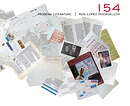Catalog 154, A

2. (ACKER, Kathy). "GORDON, Peter." I Dreamt I Was a Nymphomaniac!: Imagining. (n.p.): (Black Tarantula), 1974. Chapter 4 ("Imagining") in her self-published sequence -- this being pages 72 through 106. "Peter Gordon" is a character in the narrative, and the only name given on the cover for attribution. Acker published a number of these sequences, which were later collected in modified form. Originally, they received distribution primarily through Acker's own efforts -- direct mailing, consignment to a handful of avant garde bookstores, mostly in New York City. Acker was one of the important literary artists to emerge from New York's underground art scene in the 1970s. She combined elements of autobiography, pornography, the cut-up techniques that were pioneered by William Burroughs and Brion Gysin, and other experimental forms to create a body of work that consistently defied, and redefined, literary expectations. Her early self-published books are scarce today. Stapled wrappers; several small spots to covers; near fine.
3. ALBEE, Edward and PURDY, James. Malcolm. NY: Atheneum, 1966. Albee's adaptation of Purdy's first novel, which became something of a classic in its day. Albee is a three-time Pulitzer Prize winner for drama, and the winner of a Tony Award for Lifetime Achievement. Purdy won two Guggenheim Fellowships, including one in 1958 that allowed him to write Malcolm. This copy is inscribed by both Albee and Purdy in 1983. Fine in a near fine dust jacket with light rubbing and edge wear. Uncommon signed by both.
4. ANDERSON, Laurie. United States. NY: Harper & Row (1984). The companion book to her 1983 eight hour epic performance piece United States I-IV. Inscribed by Anderson, with an additional hand and lightning-bolt sketch. This is the issue in wrappers. Oblong quarto; fine. Books signed by Anderson, perhaps the preeminent American avant garde performance artist, and NASA's only artist-in-residence (the program was discontinued after her tenure), are uncommon.
5. (Anthology). Naked Came the Manatee. NY: Putnam (1996). A serial novel of comedy and suspense written by thirteen Florida authors including Carl Hiaasen, Elmore Leonard, John Dufresne, Dave Barry, Vicki Hendricks, Edna Buchanan, Les Standiford and James W. Hall. Signed by all authors on a single tipped-in leaf. Fine in a fine dust jacket. A virtual Who's Who of Florida mystery writers, including some of the funniest authors in the mystery genre.
6. (Anthology). Southern Excursions. (n.p.): Fellowship of Southern Writers, 1997. A limited edition of this collection of short stories, the first publication by the Fellowship of Southern Writers and intended as a fundraiser for that organization. There were 150 numbered copies, and then this issue which is identified as "one of fifteen special copies outside the numbered sequence," this being number VII as handwritten on the colophon and signed by all contributors: Lee Smith, Elizabeth Spencer, Fred Chappell, Walter Sullivan, Madison Jones, George Garrett, Mary Lee Settle, and George Core, the editor. An illustrious group of writers, winners collectively of virtually every literary award given out in the U.S. A scarce and significant volume.
7. (Anthology). The Burned Children of America. (London): Hamish Hamilton (2003). The first British edition of this anthology, first published in Italy, and here with an introduction by Zadie Smith. With contributions by nineteen American writers including Dave Eggers, George Saunders, Jeffrey Eugenides, Rick Moody, David Foster Wallace, Jonathan Safran Foer, A.M Homes, Aimee Bender, Myla Goldberg, Jonathan Lethem, Amanda Davis, and others. Only issued in wrappers. Fine. No comparable U.S. edition.
8. ARNOW, Harriette. The Dollmaker. London: Heinemann (1955). The first British edition of her best-known novel, which deals with a family uprooted from their native region and relocated to the urban confusion of Detroit during the Second World War. This book was a bestseller upon publication in the U.S. and later became a contemporary classic of feminist literature and a standard on college campuses because of the strength of its central, female character. Warmly inscribed by the author "for Virginia Patterson/ who in no small measure was responsible for the success of the American edition, not this poor substitute/ Harriette Simpson Arnow/ Thanks for the pen." (Her pen had run out of ink at the word "poor," and the color changes there from black to blue.) Laid into the book are two autograph Christmas cards signed by Arnow (1968 and 1972) with lengthy notes, particularly in the earlier one, which includes some derogatory comments about Macmillan (her American publisher), some encouraging comments for Patterson, and a couple of observations about her (Arnow's) husband and her age. Signed copies of this book, and autograph material by Arnow, are quite uncommon. The book has a tear at the upper edge of the front endpaper and a lower corner bump, otherwise it is a near fine copy in a fair, corner-chipped dust jacket fully split at the front flap fold. The pictorial dust jacket differs markedly from that of the U.S. edition. The cards are fine.